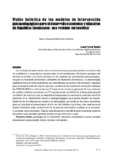Visión holística de los modelos de intervención psicopedagógicos para el desarrollo económico y educativo de República Dominicana: una revisión sistemática
Holistic Vision of Psychopedagogical Intervention Models for the Economic and Educational Development of the Dominican Republic;
Visão holística dos modelos de intervenção psicopedagógica para o desenvolvimento econômico e educacional da República Dominicana
Compartir este ítem
Fecha
2023-09-30Autor
Farray Bergé, Leonor
Citación
Metadatos
Mostrar el registro completo del ítemDocumentos PDF
Resumen
Los modelos de intervención son una base esencial para poder aportar en el desarrollo de habilidades y capacidades intelectuales en los estudiantes. El objetivo principal del artículo es develar una visión holística de los modelos de intervención psicopedagógicos para el desarrollo económico y educativo de República Dominicana. La metodología empleada fue la revisión sistemática por considerarse un proceso estructurado y riguroso para el cumplimiento del objetivo general. La directriz de criterios de validación utilizada fue PRISMA-NMA la cual cuenta con 27 ítems de los cuales se aplicaron 19. Las unidades de análisis cribadas resultaron ser 27 representando un 10,11% de la búsqueda general con filtros. Se concluyó que, en República Dominicana los resultados obtenidos en PISA ameritan de la intervención desde lo psicopedagógico para poder abordar las necesidades de los estudiantes en cuanto a su desempeño, partiendo de las áreas esenciales para así propiciar el pensamiento crítico, las habilidades cognitivas y las mejoras en el ámbito educativo, pues, el desarrollo de un país en lo educativo se refleja en la sociedad, y, por ende, en lo económico. Urge la transformación y con ello la intervención de modelos educativos que permitan generar productos significativos al país. Intervention models are an essential basis to be able to contribute to the development of intellectual abilities and capacities in students. The main objective of the article is to reveal a holistic vision of the psychopedagogical intervention models for the economic and educational development of the Dominican Republic. The methodology used was the systematic review as it is considered a structured and rigorous process for the fulfillment of the general objective. The validation criteria guideline used was PRISMA-NMA, which has 27 items, of which 19 were applied. The screened units of analysis turned out to be 27, representing 10.11% of the general search with filters. It was concluded that, in the Dominican Republic, the results obtained in PISA merit intervention from the psychopedagogical point of view in order to address the needs of students in terms of their performance, starting from the essential areas in order to promote critical thinking, cognitive skills and abilities. improvements in the educational field, then, the development of a country in education is reflected in society, and, therefore, in the economy. The transformation is urgent and with it the intervention of educational models that allow the generation of significant products for the country. Intervention models are an essential basis to be able to contribute to the development of intellectual abilities and capacities in students. The main objective of the article is to reveal a holistic vision of the psychopedagogical intervention models for the economic and educational development of the Dominican Republic. The methodology used was the systematic review as it is considered a structured and rigorous process for the fulfillment of the general objective. The validation criteria guideline used was PRISMA-NMA, which has 27 items, of which 19 were applied. The screened units of analysis turned out to be 27, representing 10.11% of the general search with filters. It was concluded that, in the Dominican Republic, the results obtained in PISA merit intervention from the psychopedagogical point of view in order to address the needs of students in terms of their performance, starting from the essential areas in order to promote critical thinking, cognitive skills and abilities. improvements in the educational field, then, the development of a country in education is reflected in society, and, therefore, in the economy. The transformation is urgent and with it the intervention of educational models that allow the generation of significant products for the country.


